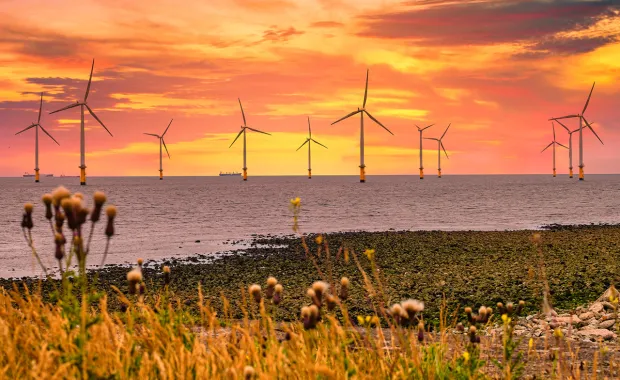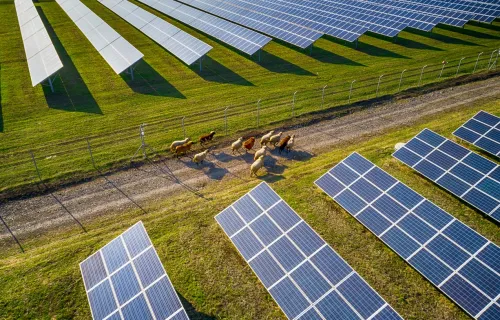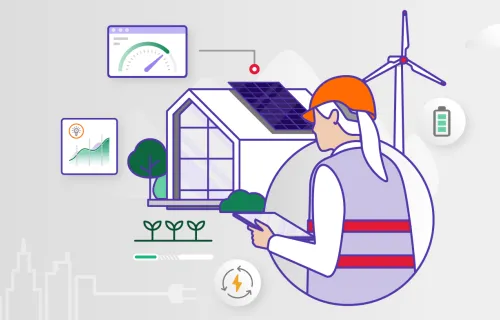Les données constituent un élément clé pour déterminer et mesurer les facteurs liés à la durabilité environnementale selon les champs d’application 1 à 3 définis dans le Protocole sur les gaz à effet de serre (GES)*, qu’il s’agisse de l’utilisation de l’énergie et des ressources, des GES ou de la performance de la chaîne d’approvisionnement. Toutefois, malgré la richesse des données accessibles, les sociétés d’énergie et de services publics n’effectuent pas nécessairement un suivi des données ESG pertinentes dans l’ensemble de leurs chaînes de valeur numériques en vue de prendre des mesures réfléchies, transparentes et traçables.
Les trois champs d’application définis dans le Protocole sur les GES sont les suivants.
Les émissions de champ d’application 3 constituent un enjeu de plus en plus important. Nicole explique que ces émissions représentent de 70 % à 90 % des activités d’une entreprise : « Il s’agit de leur chaîne d’approvisionnement, de leurs actifs de location, de leurs investissements et de leur logistique. C’est tout ce qui est pertinent pour favoriser l’atteinte des objectifs ESG et ce qui a des répercussions négatives sur l’environnement ».
Les sociétés d’énergie et de services publics ont plusieurs rôles et responsabilités en matière de développement durable. Elles doivent réduire leurs émissions de GES, favoriser l’adoption de l’énergie verte et assurer la traçabilité de l’énergie verte – de la production à l’utilisation.
« Qu’il s’agisse de responsabilisation ou de vérifiabilité, je pense qu’il est absolument nécessaire que les gens aient l’assurance de payer ce pour quoi ils ont conclu un contrat », convient Rich.
Les institutions financières commencent de plus en plus à tenir compte de l’exposition des organisations aux risques climatiques et de leur position en matière de développement durable lorsqu’elles évaluent les risques et prennent des décisions d’investissement.
« La précision est primordiale », renchérit Nicole. L’une des difficultés réside d’ailleurs dans le fait que les sociétés de placement et les institutions financières s’appuient sur les recommandations des agences de notation pour prendre leurs décisions en matière d’investissements ESG alors qu’il n’existe aucun mécanisme pour valider les données que les entreprises peuvent divulguer à ces agences. L’existence de plus de 200 agences de notation ESG et de plus de 2 000 indicateurs ajoute à la complexité.
Les facteurs ESG et la gestion des risques
« La responsabilisation commence par le secteur financier », soutient Nicole. Les valeurs culturelles ainsi que les nuances et intérêts politiques et économiques des divers marchés géographiques jouent un rôle crucial. « Il est aussi important de comprendre la pertinence de ces conversations à l’échelle locale. Il faut se pencher sur les risques, la probabilité et la prévision des risques, ainsi que la façon d’utiliser les mécanismes d’analyse des données et d’intelligence d’affaires pour mesurer ces risques et prendre des décisions préventives avant qu’ils ne se matérialisent. »
Nicole constate que la théorie des jeux peut être utilisée pour exploiter la valeur commerciale du développement durable : « Le principal élément à retenir lorsqu’on combine les principes de la théorie des jeux et ceux du développement durable est que nous ne pouvons jamais garantir ce que feront nos concurrents. Maintenant plus que jamais, nous devons être conscients de ce que nous faisons et avoir une compréhension beaucoup plus poussée de nos activités. » Nicole insiste sur ce point en raison des nombreux exemples d’écoblanchiment (greenwashing) qui résultent de la décentralisation. L’accès à des données pertinentes, éclairées et exploitables en matière de durabilité environnementale aidera les entreprises à adopter des pratiques d’affaires responsables.
Les achats de produits et services des clients sont dictés par la réputation de l’entreprise et la confiance que les consommateurs lui portent. Comment les organisations peuvent-elles gagner cette confiance? « Elles doivent faire leurs preuves : on veut des données et la garantie que celles-ci sont exactes », explique Rich.
« En partie, la réputation est aussi une responsabilité de l’entreprise envers ses employés », ajoute Nicole. Selon elle, les sociétés d’énergie et de services publics emploient un grand nombre d’employés à l’échelle mondiale. Pour se moderniser et devenir de meilleures entreprises, les organisations doivent être au fait de leurs activités, fournir des données transparentes et reconnaître qu’il s’agit d’une démarche d’amélioration continue. « Bref, elles ne doivent pas suivre toutes les tendances en matière d’idéologie », conclut-elle.
- Chapter 1: Introducing Scopes 1, 2 and 3
-
Peter Warren:
Hello everybody and welcome back to the second part of our two-part series on energy sustainability. We’ll be picking up our conversation where we left off with both Rich and Nicole.
It's interesting when you look at the ESG scopes one, two and three [of the Greenhouse Gas Protocol], maybe Nicole can give us a crash course on that. What you described had all of those elements in it. It's the primary product, it's the environment around the system to do it, and then it's the full supply chain. Nicole, what's your thought on that? Because utilities are rich in data, but usually not data for those purposes.
Nicole Zethelius:
Yes, and they need to be, or they will be, if we look at so many different industries in the "cancel culture," in general, and looking at how social media and access to information have given this capability to actually make huge decisions. We saw that in the stock markets during the pandemic, how buying power can really change, but it all boils down to information here. When it comes to scopes one, two and three, just in case our listeners aren't aware of this, this is developed through the Greenhouse Gas Protocol.
Scope one is all of the direct emissions a company makes. That's their headquarters, their purchased vehicles to get to and from the office. Scope two is all of the purchased electricity and utilities that the company uses, including HVAC. So, heating, ventilation and air conditioning are also included in scope two. Scope three is about, it could be anywhere from 70% to 90% of the business' operations. It's their supply chain, their leased assets, their investments, their logistics, pretty much everything. As I said, it's the energy that's used from the suppliers and the vendors, and all of the other interactions that a company makes. So, it's everything that is actually relevant to what's driving ESG, and what's driving environmental impact, negative impact.
- Chapter 2: Accountability
-
Peter Warren:
So, utilities and energy companies, oil and gas, etc., as we go through this transition, have a dual role. They are the foundation of somebody else's product. So, if they make greener energy, therefore somebody can claim their steel is greener, that type of scenario. One of our client partners is actually looking to use the ESG as a differentiator in their competitive electrical market to actually say their electrons, "I can prove it," are cleaner than somebody else's, and here's the math to do so. Therefore, buy mine rather than theirs. So, there are some first movers that are doing this in this area, but how do you see, for either one of you, the dichotomy of, "I'm a producer of energy, but also I have to report to the people that use it, how good or bad it is." How do you guys see that?
Nicole Zethelius:
This is about accountability, isn't it? If you're selling green energy, you need to be able to prove you're selling green energy. Wouldn't you say that Rich? You don't want to have bad actors in this whole process of transitioning to green energy. Are we producing enough green energy? This is another question. Rich mentioned nuclear energy. I'm a fan of nuclear energy, I'll come out and say that. But the reason why is because it's so abundant, and it's a very low-carbon, clean source of energy. Until we can scale up some of the better solutions, we need to think about the amount and the quantity that is required in order to run society, and in order to make energy affordable. And this is a solution that we have today. I'm not saying it's the endpoint. I just think that it's something that we should consider in the decision-making process. But, yes, it boils down to accountability. All of this reporting, the framework when it comes to ESG, why it's so relevant, is because we're starting to make financial decisions based on this non-financial disclosure and information.
Richard Hampshire:
I agree completely, whether it's accountability or auditability, I think there is absolutely a need for people to have confidence that what they are paying for is what they have contracted for. So, being able to trace low-carbon energy from production through to use is vitally important. It's equally important for us as a consumer of energy, and a large consumer of energy, through our data centers. Whilst you were talking, Nicole, I think one of the things that was running through my mind is, we are effectively part of our clients' supply chains. Therefore, it should be no surprise that our clients are looking at us for assurance that what we are doing is environmentally sound, is sustainable, and is ESG compliant. So, I think globally, our corporate commitment to net-zero is important to giving that confidence. In the UK, we've agreed on science-based targets in how we are going to achieve net-zero. We've had very, very positive feedback from our clients that we're taking such a proactive stance.
- Chapter 3: Financial risk assessment
-
Peter Warren:
Yeah, it's an interesting one because, in our conversations with our banking counterparts, there are whole portfolios shifting to only things that they consider are ESG friendly, as things they will finance and fund, or invest in. So, the financial industry is almost becoming the policeman, even if regulation isn't there. I know there's a lot of regulation, Rich, you're kind of an expert on regulation, but maybe you could touch on regulation investment. I think one more subject that you guys brought up was gamification. How do you see this all coming into how we could shift this forward? So, I kick that over to you. That's a bit of a mouthful.
Richard Hampshire:
So, the whole area of finance and the financial risk assessments starting to take account of exposure to climate risk, and how sustainable organizations are, is going to be very, very powerful, in my view, at driving corporate behaviors and taking this area extremely seriously. Because, ultimately, it's going to go to the cost of doing business. It's going to go to the cost of capital. So, initiatives at a global level like TCFD, the Task Force for Climate-Related Financial Disclosure, the work that's going on in the EU taxonomy, all of these things, I think, are going to start to impact corporate behavior, the strategic focus of organizations. Of course, if those assessments are to be fair, then it brings us back to making sure that those doing the assessments, the financial institutions, have got access to appropriate data that they can have confidence in, that is auditable and traceable, and that is actually accurate. Nicole, I'd be interested in your thoughts.
Nicole Zethelius:
Yes, I 100% agree about the accuracy. I think one of the challenges that we face today is that investment firms and financial institutions are basing decisions around their ESG investments coming from the same rating agencies that were part of subprime mortgage disasters. Is that the best solution?
Is that the best way to uptake this new source of data? I'm not quite certain about that, especially because there's no mechanism for validation of what companies can disclose to these rating agencies. There are over 200 of them and there are over 2,000 indicators around ESG alone, and that becomes extremely obscure. You almost need mass litigation just to understand it, not only sustainability and ESG controllers and experts, but also those that know how to weed through a massive amount of data and information.
-
Nicole Zethelius:
If we look at the relevance to it, in regards to taxonomy, they've gotten smart in the sense that they are chasing the money trail first. The accountability starts from the financial sector, and looking at the investments that the banking industry makes and that other financial institutions make, and seeing just how dense it is in terms of environmental impact. That's an important start. I see it obviously trending along the way going into other parts of the globe, but we have to remember that it is also relevance. If we look at India, for instance, water is at the top of the priorities. Whereas in Europe, we are talking a lot about greenhouse gas emissions. So, it's also understanding regional relevance in all of this conversation. And it boils down to risks and risk probability, risk predictions, and how do we use mechanisms of analytics and business intelligence to be able to measure these risks and make decisions before they happen, preventative in that case.
Peter Warren:
I totally agree with you on that. I had a conversation with our guys that do risk management and they want to do another seminar, another event, having nothing to do with traditional oil and gas, and utility risks. Will it burn, will it not run, and so on. It has everything to do with financial ESG risk management because that's now one of the new areas they're starting to consult people on. That's another area that is needing to be added. I don't know that everybody has that on their portfolio. Rich, do you see this being a point of conversation with your clients?
Richard Hampshire:
I think it's starting to increasingly become one, certainly from what we're seeing, both from the UK government, in terms of their demanding this as a prequalification for bidding for contracts, but also our clients asking much more searching questions about us as a supply chain partner and what our approaches are to this question. So, the short answer is probably yes.
- Chapter 4: Game theory and sustainability
-
Peter Warren:
We got a little dark and deep on that part. So, let's shift to more of a fun thing, the game-theoretical principle.
Nicole Zethelius:
Game theory is the Nobel prize-winning economic mathematic theory about how we can never guarantee what our opponents are doing. We have multiple stakeholders and opponents, and there are multiple scenarios that can occur, and we need to hedge our bets. I think the key takeaway when you connect sustainability and game theory principles is looking at we can never guarantee what our competitors are going to do. We need to be aware of what we're doing and understand our operations much more clearly, now more than ever. We talk a lot about the differentiation between decentralization and centralization. There's been a lot of greenwashing around this area because companies have decentralized so much that they don't know what the left arm is doing and the right foot, it's all over the place.
That has now come to light. This is one of the biggest trends is that, as a Gen Zer might say, "Show me the receipts." That means that if you're going to say something, you need to prove it. You need to prove it, not just from what you say, but also the data around that, that validates what you say around sustainability, around an operation. What the activity is that a company does. And this will play a huge part because the more granular we get on our buying power, and I don't know how it works for you, but I see in Sweden here, in Stockholm, it's very particular about the origins of things. You want to know exactly where your meat comes from, and in what region, you want to know where your dairy comes from.
I think it's also in part EU legislation, but you will know exactly where all produce and everything comes from, as well as your consumer products. So, if we get down to that granular level and that expectation of society, we will need to eventually provide, almost like nutrition facts, to our consumers and our businesses in terms of environmental and social impact. We are now in the phase where greenwashing has happened quite a lot in the last 10 years, and now it needs to be mitigated by one, regulation, and two, being able to prove that you're not doing it. This is where data really plays its part. Then actionable, how do we utilize this data in the best way to lower things, but when it comes to game-theoretical principle, it's always that we see big companies making divestments around carbon, and they need to be asking themselves is this the best solution, because their competitor might come in and sweep up, and buy whatever they divested and do a worse job than the company who divested did.
We need to look at it from a long-term perspective and be really smart about it, and not just look at the whole entire, oh, the utilities industry is emitting this much and we need to get rid of everything all at once. It doesn't work that way. It needs to be gradual and it needs to be responsible in the way that we make these decisions, economically. We mustn't forget. The economy is a big, important part.
- Chapter 5: Individual and organizational actions
-
Peter Warren:
Good thoughts on that. Maybe some final thoughts as we wrap up here.
Richard Hampshire:
Yeah. I agree. I think there are a couple of interesting things in what Nicole has talked about. One is our response as individuals and who we choose to give our money to for buying services or for buying products. That ultimately goes to the organization's reputation and our trust in them. How do they prove that, how do they secure that trust? That comes down to being able to evidence it, which brings us back, and brings us full circle to data and having confidence in the regulation that the data is accurate. It's giving an accurate representation of the impact of those organizations. So, I think there is a piece here around us as consumers, our expectations, our behaviors, but also what that's going to mean in terms of the increasing importance of organizations' reputations, in order to secure our business.
Nicole Zethelius:
Very good point.
Peter Warren:
Cool. How would you respond to that, and maybe some wrap-up thoughts from you?
Nicole Zethelius:
I think that's an excellent point. In part, reputation is also a company's responsibility to their employees. We look at utilities companies, we look at oil and gas. They have a huge responsibility of employing an enormous amount of people, globally. If we put pressure to do everything on the UN Sustainable Development Goals (SDGs) charts, they're not going to hit all marks. No company really can hit all marks. But what I think that companies can do to become more modernized and better companies, is to know what they're doing, to provide data that is transparent enough, but carefully, and say like, "Okay, this is how we operate. We are on our way to becoming cleaner, with continuous improvement." If I were to give advice to our clients and the audience it is that you should know what your competitors are doing in terms of sustainability in ESG.
You should keep up with that pace. You shouldn't be far behind. You should either be leading or with the pack. Keep up with regulation and look at the risks that are related to this, because there are a great deal of risks that are connected to assets and to revenue. So, just to look at it from a different perspective and not hold onto every trending ideology that comes up, because that's where the obscurity occurs. You need to remember what is relevant for a company, and what a company can do, and has no actionable way to do. That's my wrap-up and advice to take away from this.
Peter Warren:
Well, thank you for that. Thank you to both of you. I think that I heard a quote the other day that the difference between ethical and moral ethics is knowing what's right and wrong. Morality is doing it. As companies go into this new world and their brand, their association, their end product, as it goes into the supply chain, their morality on how they approach this, honestly and openly, is going to be a key one. And all the things about data and risk that we discussed today are the key factors.
So, I'd like to thank you both, wrap it up there, and we will talk to you all again on the next one. Appreciate you. Bye-bye.
Nicole Zethelius:
Thanks a lot. Bye-bye.
Richard Hampshire:
Thanks, everyone.







